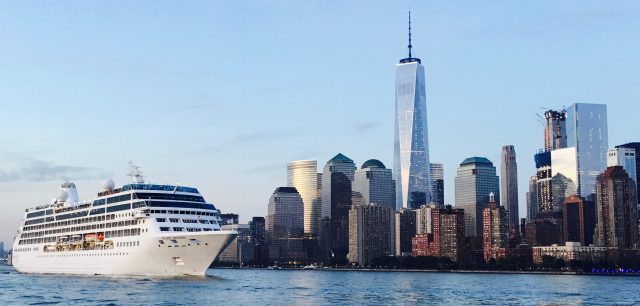The post-Covid future: Desire and greed
2020-04-28
Like yours, my inbox has been filled with inspiration, sadness, data, static, notes from personal friends I haven’t heard from in years, notes from industry friends who find themselves suddenly unemployed, invitations to view or participate in webinars or Zoom calls or Hopin groups or GoToMeeting events or HouseParty happy hours, solicitations to buy products related to sanitation or health and internal notes from staff and colleagues who, like me, are also sifting through all of the above as we plot our way forward, personally and professionally.
And on rare occasions, when I open a message from a friend who is ill or whose loved ones are ill or have passed away, I’m slapped anew with the stark reminder of why every communication above has a common topic.
Never before have I been presented with more information and so many possible starting points from which to evaluate a difficult situation, to try to separate what’s important intelligence from subtly flawed reasoning, to discern insight from shots in the dark. I doubt I’m the only one who feels this way, and I doubt I’m the only one whose viewpoint evolves daily, if not hourly.
It’s not a wholly intellectual exercise. I’m as likely to be struck by my emotions as by reason, and I was surprised that one email that had outsize impact on me was fished out of my spam filter. It featured a graphic sensibility I hadn’t seen since the 1990s and came from a travel agency I didn’t know.
The line that caught my attention: Miami to Rio, $265, all taxes included.
Had my 2020 travel plans not been disrupted, I would have been in Costa Rica last week and on the Riviera Maya this week. Instead, the most significant travel I’ve undertaken in the past month has been shifting my dining room chair two inches to the right so that a pair of bookcases behind me appear symmetrical during Zoom calls.
From this chair I’ve viewed dozens of beautifully produced and inspiring videos, but this one email, offering a bargain basement fare to Rio, unearthed not only a deep longing to see the world beyond my window but renewed awareness that perhaps the most potent mix of human motivation — the one that may pull us out of this crisis — is desire and greed.
For now, the industry is appropriately focused on safety, flexibility and trust. It’s too early for that Miami-to-Rio fare to motivate a purchase by anyone who wasn’t already planning that route out of necessity.
But it reminded me of a quote in stories published in Travel Weekly on Sept. 11, 2002, exactly one year after the 9/11 attacks. The articles were excerpted from a roundtable I moderated among executives in every travel industry sector about their experiences attempting to stabilize their businesses.
Many of those companies were still far from truly stable. But the quote I was looking for was uttered by Phillip Kleweno, then-president of P&O Princess Cruises. Reflecting on his cruise line’s resilience, evidenced by three consecutive quarters of year-over-year increases in earnings and ships at full capacity, he said, “We found the intersection of greed and fear.”
He acknowledged that yields had been down between 5% and 8% for most of that period but noted that prices had, in only one year, returned to pre-9/11 levels.
I believe there are clues in this 18-year-old discussion about how human nature — which seldom displays unprecedented behavior, even in unprecedented times — may shape the travel industry’s post-Covid future.
Will finding Kleweno’s intersection of fear and greed work again?
Not necessarily.
Under the assumption that wide-scale travel will not resume until there is widespread immunity or a vaccine or other pharmacological counters to Covid symptoms, fear may, at that point, be less a factor than desire.
But fear has a younger cousin that may dawdle: apprehension. There may be a desire to travel, but lingering health-related concerns are predicted to lead to social distancing protocols remaining in effect for some time. This will likely have the knock-on effect of reducing capacity in mass-market products such as cruise ships and resorts.
Laws of supply and demand being what they are, the combination of heightened desire and lower inventory could result in higher pricing, though less overall revenue. If expenses are reduced in proportion to capacity cuts — more easily accomplished in some sectors than others — there may be a path to profitability, albeit a narrower path with lower gross earnings. But even so, this could provide a viable bridge until the resumption of higher-density travel begins.
Consumer greed, combined with desire, may play out in ways that produce long-term benefits for the industry. One of the vexing problems back when we were all concerned about overtourism — three months ago? — was the challenge to lure people away from crowded destinations such as Venice, Barcelona and Dubrovnik and toward lesser-known but equally rewarding destinations that had capacity to spare.
A possible silver lining: As low density and low pricing become a virtue and priority for post-Covid consumers, many places that are virtually unknown to travelers today may emerge as long-term tourism draws, spreading the benefits (and challenges) of a tourism economy to areas that once struggled for attention.
• • •
And finally, an observation about the present. I’ve written previously about virtual happy hours over Zoom between advisors and their clients as a means to keep communications open and dreams alive.
I recently heard about a variation that ups this concept a notch: The inclusion of a supplier, whether a destination marketer, tour operator, hotelier or cruise or resort representative. These suppliers now often find themselves with plenty of time on their hands at the moment, and will likely be more than happy to participate.
Many thanks to Tasha Lynn Koerner-Stahl, owner of Pack and Play Travel in Huron, S.D., for sharing this tip.
Courtesy of Travel Weekly

